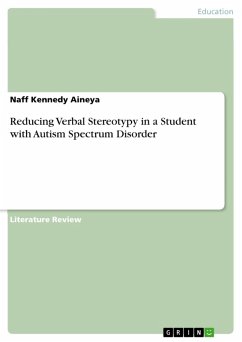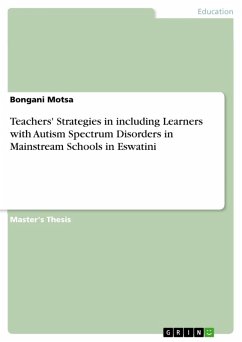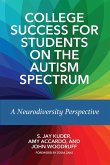Literature Review from the year 2022 in the subject Pedagogy - Inclusion, grade: 2.9 (out of 4), , language: English, abstract: This paper expounds on the early features of autism spectrum disorder (ASD) and frequencies of involvement in daily games, plays, and physical activities. Stimulus control using red card/green card, vocal self-stimulation, and the effect of multiple interventions for decreasing speaking stereotypy in a child or student with autism. A student with autism spectrum disorder has speaking, learning, and socialization problems and consistently involve in repetitive habits. Studies show adequate interventions for the students are lacking, but development is made in learning, socialization, adaptive and intellectual skills. Stereotyping is a core symptom referred to repetitive behaviorist and topographic invariant. Echolalia, contextual verbs, and vocalization are stereotypies controlled by automated positive reinforcement. The condition hinders learning if the behavior consumes the student's daily activities and limits participation in activities, such as vocation, leisure, and skills in academic settings. Therefore, treating stereotypies decreases the stigmatization of a student with ASD. Ahearn et al. (2007) also confirm that autism condition regards impairment in speaking, listening, socialization, and communication, indicated by restrictive and repetitive stereotyped behavior. It is critical to detect the situation early and begin targeted treatment. Memari et al. (2015) suggest that children with vocal stereotypy condition face challenges concerning age group games and fail to develop social relationships. Esposito et al. (2021) examined stereotypy habits shown by a seven-year child with autism and controlled by automatic reinforcement under stimulus conditions. Using discriminative training method. The discriminative training involves matching a green card (SD) with free access to vocal stereotypy and a red card (SD-absent) with interruption of stereotypy and vocal redirection. Kahveci & Bulut (2019) concentrated on the non-aversive vocal and speaking teaching method with reinforcement protocols to enhance the frequency of communication attempts in students with ASD. Vocal stereotypy is now understood to have the potential for learning development, although they have delayed social consequences. Stereotypy's underlying causes are unknown, and many researchers and scientists have done studies on appropriate intervention, but the result has produced varied results.
Dieser Download kann aus rechtlichen Gründen nur mit Rechnungsadresse in A, B, BG, CY, CZ, D, DK, EW, E, FIN, F, GR, HR, H, IRL, I, LT, L, LR, M, NL, PL, P, R, S, SLO, SK ausgeliefert werden.









